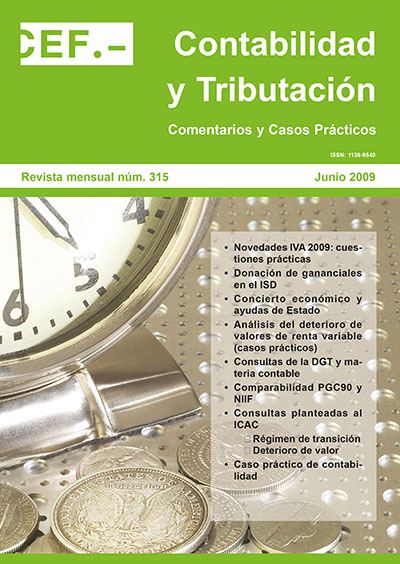¿Es comparable la información contable antes y después de las NIIF?
DOI:
https://doi.org/10.51302/rcyt.2009.7755Palabras clave:
políticas contables, comparabilidad, NIIF, PGC90Resumen
El estudio analiza el impacto de la aplicación de las NIIF en las magnitudes más importantes de las cuentas anuales consolidadas de grupos que cotizan en el mercado continuo español, ofreciéndose explicaciones a los cambios encontrados con el PGC90. Para numerosas empresas se dan cambios materiales al pasar a NIIF (definidos como diferencias de 10% o más en su valoración). Las partidas con cambios más importantes son los activos financieros (en el caso del 44% de las empresas), el resultado (40%), pasivos no corrientes (38%) y el patrimonio neto (31%), aunque en muchas otras hay cambios también relevantes. A causa del cambio de las partidas anteriores, las ratios de rentabilidad cambian de forma material para aproximadamente la mitad de las empresas, y la de endeudamiento total para un 30%.
Descargas
Citas
Adams, C; Weetman, P.; Jones, E. y Gray, S. [1999]: «Reducing the burden of US GAAP reconciliations by foreign companies listed in the United States: the key question of materiality», The European Accounting Review, 8 (1): 1-22.
Gray, S. J. [1980]: «The impact of international accounting differences from a security-analysts perspective: Some European evidence», Journal of Accounting Research, 18 (Spring): 64-76.
Harris, M. S. y Muller, K. A., III. [1999]: «The market valuation of IAS vs. U.S.-GAAP accounting measures using Form 20-F reconciliations», Journal of Accounting and Economics, 26: 285-312.
Haverty, J. L. [2006]: «Are IFRS and U.S. GAAP converging? Some evidence from People’s Republic of China companies listed in the New York Stock Exchange», Journal of International Accounting, Auditing and Taxation, 15: 48-71.
Hung, M. and Subramanyam, K. R. [2007]: «Financial statement effects of adopting International Accounting Standards: the case of Germany», Review of Accounting Studies, 12 (4): 623-657.
Soderstrom, N. S. y Sun, K. J. [2007]: «IFRS Adoption and Accounting Quality: A review», European Accounting Review, 16 [4]: 675-702.
Street, D. L., Gray, S. J. and Bryant, S. M. [1999]: Acceptance and observance of International Accounting Standards: an empirical study of companies claiming to comply with IASs, The International Journal of Accounting, 34 (1): 11-48.
Street, D. L., Nichols, N. B., y Gray, S. J. [2000]: «Assessing the acceptability of international accounting standards in the U.S.: An empirical study of the materiality of U.S. GAAP reconciliations by non-U.S. companies complying with IASC standards», The International Journal of Accounting, 35 (1): 27-63.
Van der Meulen, S.; Gaeremynck, A. y Willekens, M. [2007]: «Atribute Differences between U.S. GAAP and IFRS earnings: An exploratory Study», The Internacional Journal of Accounting, 42: 123-142.
Weetman, P. E., Jones, A. E., Adams, C. A., & Gray, S. J. [1998]: «Profit measurement and UK accounting standards: A case of increasing disharmony in relation to U.S. GAAP and IAS’s», Accounting and Business Research, 28 (3): 189-208.















